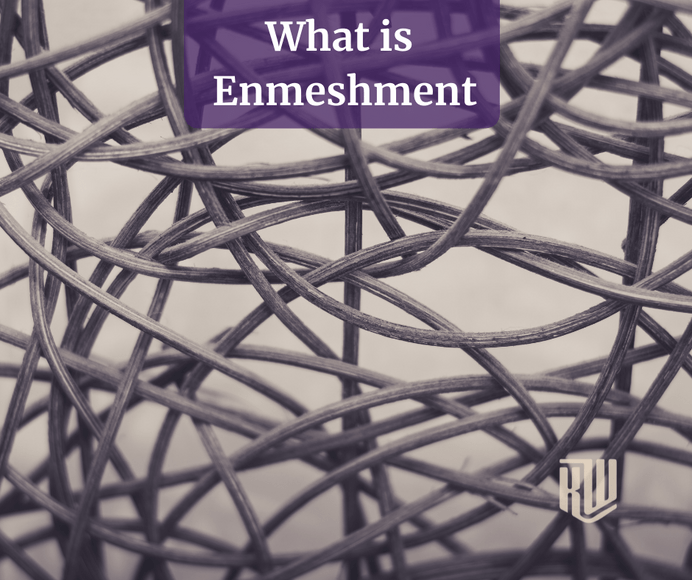Welcome back! Today we are talking about enmeshment: what is it? It’s not something most people are aware of – perhaps you’ve never even heard the term.
So let’s dive right into it.
Enmeshment is a parenting style that’s mischaracterized as loving and loyal. In reality, there are elements of psychological and emotional incest in enmeshment.
This gets perpetrated through the behaviors and communication styles of the parents, as well as actions. It’s similar to codependence, but there are some key distinctions.
In an enmeshed dynamic, the parent uses the child for intimacy, companionship, romantic attachment, advice, ego fulfillment, and/or emotional release.
The key is the parents are completely unaware they’re doing this. They are also completely unaware that they struggle with unmet emotional and psychological needs, broken from their own childhood trauma.
Society and media have not educated us on what healthy parenting looks like – it’s not the parents’ fault. We aren’t blaming; they just didn’t know. If you find in this article yourself or your family, don’t beat yourself up. It’s widespread. Give yourself grace but take ownership.
It will allow yourself to heal.
These parents do not see the harm they are imposing. Many see themselves as wholly devoted and self-sacrificing in their child’s best interest.
They don’t realize they’re using their child to satisfy their own needs. This happens most commonly in single-parent households and in households where the partners aren’t getting along.
Let’s move on to some of the characteristics:
I’ve zoomed in on 17 of the most prevalent traits with examples. First, I encourage everyone to get a copy of The Emotional Incest Syndrome by Dr. Patricia Love.
Don’t shy away from the title – there is excellent information in that book so tackle it.
- Over-involved parents. Their lives center around their children even into adulthood. They feel lost and lonely if their children are gone.
- They will lament when the child grows up – they are losing the romantic connection they developed.
- Parents who have few friends and/or little support.
- Parents who know too much about their child’s personal relationships, activities, and problems.
- They demand to be included. A prime example is a mother I know who spent the first week with her daughter at her college! That’s severe enmeshment.
- Parents who share too much personal information create feelings of unhealthy dependence. This happens most commonly when they lament to the child about their spouse or ex.
Children are not developed enough to handle all of that emotion
- It’s very abusive. When I was little, my mom once told me she “took me for granted.”
- That’s the first memory I have of my mom enmeshing with me, where I felt a massive responsibility towards her.
- Parents whose self-worth depends on the child’s success and accomplishments.
- This is the classic screaming parent at the little league game. Sometimes they are trying to realize their unmade dreams through the child.
- This ties significantly with the recent college admissions scandal – horrific abuse. My father used to say to me.
- “you’re the easiest of all the kids.” The book mentioned above details a comment that it is an “unconscious device” meant to relieve the parent from the “burden of parenting.” Underneath is an ultimatum.
- The parent isn’t able to handle the needs of the child. Dr. Love also details these phrases to bolster the parent’s ego – it makes them feel like they are a good parent and thus a good person.
Parents who don’t encourage them to follow their own dreams and impose their goals onto the child.
- They pick the activities, schools, careers, friends, all of it. They subtly or directly criticize a child’s independence. “Why do you want to live there? It’s so far from us.” Or “Fine, go out. I’ll be fine by myself.”
- There’s a subtle bind to keep the child there. Children owe us nothing .
- we chose to have children. Enmeshed parents think their children owe them something – they don’t. Our job is to create an emotional environment to let them become what they want, not what we want.
- Parents who expect their children to still follow their rules, even into adulthood, accept their morals and values.
How many secrets do you have from your parents because you know they won’t approve?
- You’re sacrificing your own belief system to make your parents happy.
- Parents that shun the child if they don’t be and do what they want.
- Incessantly worried parents. They’re always worried their child will get hurt, not letting them do anything.
- Frequently, the parent is scared, and yet the child is excited! Nothing terrible will happen in most instances
- Allowing the child to get a scraped knee and learn from the experience is far better than acting out of parental fear.
- Parents spoil their children or take care of them financially. I have a client with a horrific case of abuse
- This woman came to me in her late 20s has not had a real job. She would rack up huge bar bills, and her mom would pay for all of it, no questions asked.
Mom was an alcoholic and needed someone to drink with .
- Bad habits were OK. If my client tried any self-care like a yoga class, the mom would threaten to cut her off. She used finances to keep her daughter close to her.
- Thankfully this woman has made incredible progress, and remember you always can too.
- Parents react with anger if their adult child tries to set limits or boundaries of any kind. Parents who respond angrily to this article would be a prime example.
- An opposite-sex parent criticizes their child’s partner or competes with the partner for love.
- They’ll do anything to prevent you from feeling closeness with your partner. They’ve made you a surrogate spouse .
- my mother did this to me, wanting me to be her emotional support system. My mother also sexualized our relationship . she’d comment on how I look, say I was “gorgeous,” and it was said with lust. This is covert sexual abuse. She never touched me physically, but my mom’s comments and looks were indirectly sexual, which is still abusive.
People who feel each other’s emotions.
- This is the classic “empath.” That’s just a new buzzword – it really means the person has no boundaries, is severely codependent, and enmeshes quickly.
- They can be happy, but if someone negative or in pain comes around, they immediately drop. This could be a child to parent or vice versa.
- Usually, it’s the child becoming the parent’s emotion. This creates the “empath.” That used to be me! It took massive work to stop doing it .
- it’s not healthy. Genuine empathy is excellent, but it doesn’t mean we get sucked in. We shouldn’t lose ourselves. We must heal from our abuse to grow from this.
- Genuine empathy has boundaries – We don’t become, absorb or take on the sadness and pain of others.
- Parents that expect the adult child to call them daily or frequently visit.
- They’ll expect the child to drop their plans and revolve around the parent. If the child doesn’t, the martyr will come out of the parent.
- Parents that make the child the scapegoat or conversely make the child the “golden” child. Sometimes it’s both .
you may be in limbo and never know which it truly is.
- Neglectful parents. This happens in single-parent households when parents need to work and aren’t there. Or the parents have an addiction, and the children are left alone. It forces the child to become an adult far earlier than expected.
- Parents that sexualize their children, like the example I gave earlier. Unfortunately, I see this happen a lot – “Daddy’s little girl” and “Mommy’s little boy” is an unhealthy romantic dynamic.
I could go through hundreds of more traits – there are so many more. I implore you, if you feel you have gone through these or are doing these things, please read the book mentioned above by Dr. Love.
You will learn much about yourself and perhaps why you are struggling in relationships. Every parent does a level of this to their child . we all can know. Part of the recovery process is to gain knowledge to develop skills that become tools.
I believe if you are reading this, you want to love your child as best you can. Unfortunately, we haven’t been taught the most loving ways, but we can learn now.
If you believe you experienced this type of parenting and want to gain the knowledge, skills, and tools to heal your codependence, I have created masterclasses that will empower you to do so.
Enjoy The Journey!
Learn more here:





